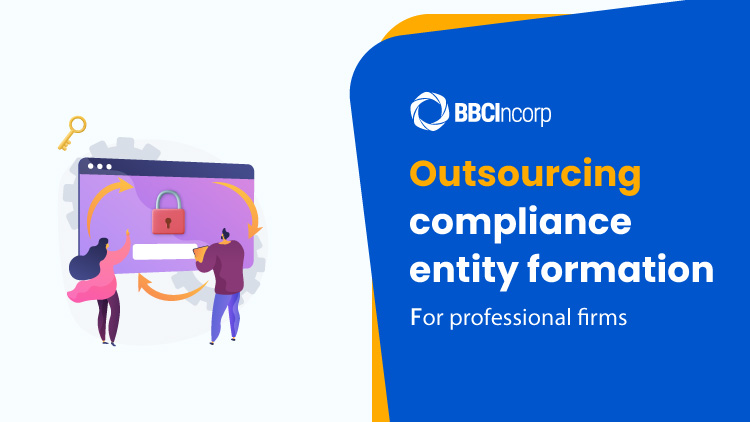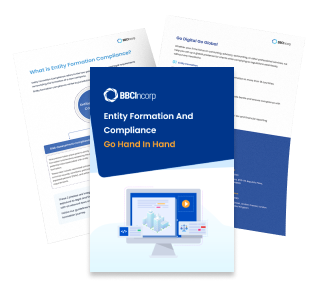
Professional service firms are looking to outsource certain aspects of compliance workload as compliance has become more difficult to manage.
More than one-third (34%) of the 750 firms polled by Thomson Reuters in 2020 said they outsource at least one aspect of entity formation compliance.
This article assists firms in better understanding the practices of outsourcing compliance processes for entity formation and their benefits, as well as providing an objective viewpoint by demonstrating some potential problems when outsourcing.
Why outsourcing compliance for entity formation?
There are an increasing number of compliance requirements that professional services must meet when establishing a new entity for clients, ranging from government regulations and filing requirements to global standards and policies.
Firms are motivated to outsource compliance for the following reasons:
- Increasing legal requirements for entity formation
Entity formation has become more and more challenging, involving an array of different standards. By outsourcing, professional firms can shed a lot of time-consuming work and reduce the burden of keeping up with standards, regulations, and changes.
Furthermore, firms can devote less time to learning about how regulations are changing in different jurisdictions and more time to delivering client satisfaction.
Compliance policy/activity tracking was mentioned by 41% of firms surveyed by ACA in 2021 as one of the top risks in compliance management.
- Shortages in resources and skills for due diligence
As professional firms take on more clients from around the world, the amount of due diligence also increases. Yet, firms don’t have enough resources and manpower to handle everything in-house.
Gaps in due diligence assessment could endanger both firms and clients, so firms are outsourcing some of the work to third-party experts to avoid these risks, such as verifying clients’ portfolios, checking risk and compliance implications, as well as investigating business activities.
Compliance has become even more complex as clients expanded across borders. It’s now important that firms find practical ways to manage global compliance and reporting obligations around the world.
- Cutting down costs for compliance management
According to CEI’s Ten Thousand Commandments in 2021, US businesses spend an average of $10,000 on regulatory costs for entity formation projects. This includes money spent on penalties for noncompliance and late filings.
Firms can fulfill compliance tasks and meet regulatory requirements at a low cost by outsourcing to a reputable company, even if they do not have an in-house Compliance Officer.
Possible challenges in outsourcing compliance management
- Changes often take time to happen
Many professional service firms are still hesitant when it comes to outsourcing compliance because they fear the potential loss of control they have over the process.
In the end, professional firms still take full accountability for non-compliance, which is why many choose to keep almost everything in-house.
- The in-house team may not like the changes, either
When considering outsourcing, firms will likely meet with resistance from internal (in-house) compliance teams, who are already managing the process.
Nobody wants their jobs taken away or diminished, and the idea of a (potentially) more dedicated team “taking over” is something in-house teams will be against.
- Loss of service quality
According to the ACA’s Report on Compliance Management’s Key Trends in 2021, 58% of organizations say the most difficult challenge to compliance outsourcing is vendor responsiveness during the due diligence phase.
Many firms believe that outsourcing will lower service standards and are concerned that expectations will not be met by outsourcing partners, resulting in not only poor service but also compounding fines from compliance failures.
What firms can do to minimize the risks of outsourcing compliance?
- Helping outsourcing partners understand the complexity and nuances of the project
Firms and partners must have mutual agreements and understandings about entity formation compliance.
While third-party providers are most needed typically for their audit and regulatory expertise, professional firms should enhance outsourcing partners with specific knowledge about clients’ backgrounds, portfolios, and insights, whenever and wherever necessary.
- Keeping things between the in-house and the outsourced teams transparent to prevent conflicts
It is critical to remember that outsourcing is about supplementing existing in-house functions rather than replacing them. The in-house team will continue to be critical in overseeing the outsourced work.
Firms ultimately bear responsibility for the compliance process. As a result, transparency and real-time reporting are critical components in maintaining a positive working relationship between firms and internal compliance personnel.
Quick guide
Entity Formation Compliance
Understand global compliance issues to ensure risk-free entity formation journey for clients.


Conclusion
Outsourcing compliance for entity formation can help cut down yearly costs, increase capabilities, and raise the service quality. This allows professional services to create client value and enhance profitability.
Even though the benefits of outsourcing the compliance process are undeniable and some professional firms might have realized it’s time to change, they keep holding back because there is no clear path to follow. For many firms, the lack of confidence in the way ahead is the biggest challenge. And that’s what BBCIncorp is here for!
We help you eliminate compliance risk and provide you with peace of mind for each entity formation project. Contact us via service@bbcincorp.com to learn more about our solutions and find out how we can tailor our services to suit your needs.
Disclaimer: While BBCIncorp strives to make the information on this website as timely and accurate as possible, the information itself is for reference purposes only. You should not substitute the information provided in this article for competent legal advice. Feel free to contact BBCIncorp’s customer services for advice on your specific cases.
Industry News & Insights
Get helpful tips and info from our newsletter!
Stay in the know and be empowered with our strategic how-tos, resources, and guidelines.


